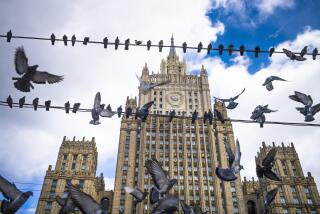Gorbachev and Libyan Discuss Arms, Terror
- Share via
MOSCOW — Soviet leader Mikhail S. Gorbachev pledged Tuesday that the Kremlin will maintain arms supplies to Libya, but he linked this to a warning on terrorist acts that could be used as a “pretext” for “imperialist attacks.”
The official news agency Tass said that a meeting with Libya’s visiting No. 2 official, Abdel-Salam Jalloud, produced a call for a condemnation of terrorism.
The United States has accused Libya of sponsoring anti-U.S. terrorism and said the American air attack on Tripoli and Benghazi on April 15 was a response.
Gorbachev on Tuesday denounced the air assault, saying it shows the world “what imperialism is,” and he reiterated unchanging support for Libya, Tass said.
U.S. ‘Adventures’
The Soviet statement was issued shortly after the arrival in Moscow of a major Kremlin ally, Syrian Vice President Abdel-Halim Khaddam, who warned that new U.S. “adventures” could not be ruled out.
“Therefore, what is needed is vigilance, steadfastness and a high level of defensive capacity of countries that might become the target of an imperialist attack, and there is need for adherence to principle and consistency in the condemnation of those pretexts that the imperialists use and, first of all, terrorism in any of its forms,” the statement said.
Tass did not make clear whether the sentence referred to both men’s views or just Gorbachev’s.
Western diplomats said the inclusion of the phrase in the official agency’s report meant it was clearly a view that the Kremlin wished to put across.
After the U.S. attack on Libya, Moscow reacted fiercely, denouncing the raid as a deliberate blow to East-West relations and canceling a meeting between Foreign Minister Eduard A. Shevardnadze and Secretary of State George P. Shultz.
The Kremlin also specifically rebutted U.S. charges that the government of Libyan leader Moammar Kadafi was behind the April 5 bombing of a West Berlin nightclub frequented by American soldiers.
The U.S. government said it has evidence that the bombing, which killed two people--one of them an American sergeant--and injured more than 200 others, was ordered from Tripoli, and it cited the bombing as justification for the air raid 10 days later. The Tass report said the Soviet side expressed its readiness to develop economic cooperation with Libya on a long-term basis and “to assist it in strengthening its defense potential.”
Message From Kadafi
Jalloud, who arrived in Moscow on Monday, brought a message from Kadafi and takes back Gorbachev’s expression of solidarity with the Libyan people, Tass said.
Before seeing Gorbachev, Jalloud met with Premier Nikolai I. Ryzhkov, Defense Minister Sergei L. Sokolov and Shevardnadze.
A Tass report on the meeting said the officials had “a detailed exchange of opinions” on current international matters, a wording that indicates disagreement.
But the Soviet agency said the talks, which concentrated on bilateral relations, took place in “a spirit of friendship and understanding.”
In a speech at a Kremlin dinner for Jalloud on Monday night, Ryzhkov was quoted as praising Libya as “the country that has not wavered when faced with an outright imperialist aggression of the United States.”
‘West Has No Morals’
According to Tass, Jalloud declared that America’s “criminal terrorist-style aggression” against Libya and Western reaction to the nuclear disaster in the Soviet Ukraine “have confirmed that the capitalist West has no morals.”
The Soviet Union and its East Bloc allies have an estimated 3,500 advisers in Libya, and the Soviets are thought by Western analysts to have shipped about $10 billion worth of arms to Libya since 1970.
Arab sources and Western diplomats said the visits of Jalloud and Khaddam, deputy leaders of two of Moscow’s closest allies in the Arab world, were planned to coincide.
“It’s not a coincidence they are both here,” said one Western diplomat. “These guys are obviously the source of American and Israeli anger. The Soviets are probably looking for some coordinated action.”
Higher-Level Delegation
Khaddam was met at the airport by Shevardnadze, while Jalloud was welcomed Monday by a higher-level delegation headed by Ryzhkov.
The Arab sources said the two delegations were likely to discuss with Kremlin officials what the Soviet media have portrayed as a possible imminent U.S. or Israeli attack on Syria or Palestine Liberation Organization bases.
Gorbachev told a group of visiting British politicians Monday that such an attack could have incalculable consequences. He said the United States and its allies have been trying to prevent Moscow from playing a constructive role in the Middle East.
Western diplomats said Syrian President Hafez Assad, who is in Greece, has received assurances from Moscow that he is free to invoke the military clauses in the 1980 Soviet-Syrian friendship treaty if an Israeli attack occurs.
Without being specific, those clauses appear to provide a formal basis for Soviet support--or direct intervention--in any future conflict between Syria and Israel.
80 Warplanes Downed
During Israel’s invasion of Lebanon in 1982, the Israeli air force shot down about 80 Syrian warplanes and knocked out Syria’s missile defense system on the border with Lebanon. The Soviet Union replaced Syria’s losses, in many cases with newer equipment.
Middle East analysts in the West have said the Kremlin has responded generously to recent Syrian requests for arms and is making available to Damascus its modern SAM-5B anti-aircraft missiles as well as new MIG-29 aircraft.
The Kremlin has no diplomatic ties with Israel but has always recognized its right to exist. Since Gorbachev took office in March, 1985, Moscow has also sought to build closer links with the moderate Arab states of the Persian Gulf.
More to Read
Sign up for Essential California
The most important California stories and recommendations in your inbox every morning.
You may occasionally receive promotional content from the Los Angeles Times.













